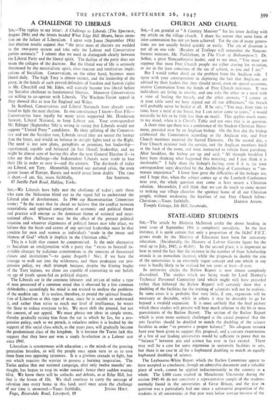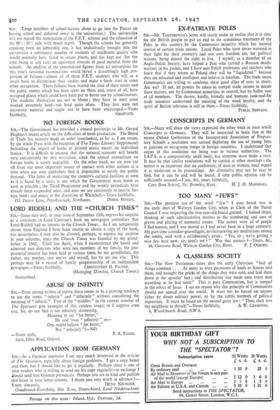STATE-AIDED STUDENTS
Sut,—The article by Marjorie McIntosh under the above heading in your issue of September 19th is completely unrealistic. In the first instance, it is quite certain that only a proportion of the 34,167 F.E.T. grants made by the Ministry of Education have been for university education. (Incidentally, the Ministry of Labour Gazette figure for the total up to July, 1947, is 40,485). In the second place, it is important to bear in mind the fact that the increase in the number of State Scholarship awards is an immediate increase, while the proposals to double the size of the universities is an extremely vague concept and one which in any case is hardly likely to be realised for ten years at least—if ever.
In university circles the Barlow Report is now almost completely discredited. The studies which are being made by Lord Hankey's Technical Personnel Committee (and which might well have preceded rather than followed the Barlow Report) will certainly show that a doubling of the facilities for the training of scientists will not be realistic. In some cases it is probable that very little, if any, expansion will be necessary or desirable, while in others it may be desirable to go far beyond a twofold expansion. It is most unlikely that the final picture which these studies will present will bear much relation to the hit or miss guesstimates of the Barlow Report. The section of the Barlow Report which is even more seriously challenged is the casual proposal that the arts faculties should be doubled to match the doubling of the science faculties in order " to preserve a proper balance." No adequate reasons have ever been given to support this proposal, and a cursory examination of a few of our leading universities would be sufficient to prove that no " balance" between arts and science has ever in fact existed. There may well be a case for some expansion in university facilities in arts, but there is no case tt all for a haphazard doubling to match an equally haphazard doubling of science.
The Leybourne-White Report which the Barlow Committee appear to have accepted as conclusive, though an admirable document and a valuable piece of work, cannot be applied indiscriminately to the country as a whole. The 1,000 cases studied in Manchester University during the session 1945-46 do not constitute a representative sample of the students normally found in the universities of Great Britain, and the year in question was a particularly bad one since a substantial proportion of the students in all universities in that year were below average because of the
war. (Large numbers of school-leavers chose to go into the Forces on leaving school and deferred entry to the universities.) The universities will not regard the termination of the F.E.T. scheme and the relaxation of the W. :10% rule with much regret. Though the scheme has generally speaking been an admirable one, it has undoubtedly brought into the universities a substantial number of students of indifferent quality who would normally have failed to secure places, and has kept out (for the time being at any rate) an equivalent amount of good material from the schools. An analysis of the consolidated figures from all universities for this year's sessional examinations would reveal a disturbingly high pro- portion of failures—almost all of them F.E.T. students who will as a result have to discontinue their studies and make a fresh start in some other occupation. These failures have wasted the time of their tutors and the public money which has been spent on them and, worst of all, have occupied places which could have been put to better use by school-leavers. The students themselves are not to blame ; they have in most cases worked extremely hard—too hard quite often. They just were not university material and ought not to have been encouraged.—Yours



































 Previous page
Previous page